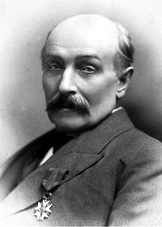Randal Cremer facts for kids
Quick facts for kids
Randal Cremer
|
|
|---|---|
 |
|
| Member of Parliament for Haggerston | |
| In office 24 October 1900 – 22 July 1908 |
|
| Preceded by | John Lowles |
| Succeeded by | Rupert Guinness |
| In office 18 December 1885 – 13 July 1895 |
|
| Succeeded by | John Lowles |
| Personal details | |
| Born | 18 March 1828 Fareham, Hampshire, England |
| Died | 22 July 1908 London, England |
| Political party | Liberal |
| Awards |
|
Sir William Randal Cremer (born March 18, 1828 – died July 22, 1908) was a British politician. People often called him "Randal". He was a Liberal Member of Parliament (MP). Cremer was also a pacifist, meaning he believed in solving problems without war. He was a strong supporter of international arbitration. This means countries should talk and agree instead of fighting. In 1903, he won the Nobel Peace Prize for his efforts to promote peace.
Early Life and Work
Randal Cremer was born in Fareham, England. His family was working-class. His father left when Randal was very young. His mother raised him and his two sisters. She made sure he went to a local Methodist school. He also learned a lot by going to free lectures. Cremer became a skilled carpenter after training as a builder.
In 1852, Cremer moved to London. He became active in organizing workers. He quickly became a respected leader for workers' rights. In 1865, he became the Secretary of the International Workingmen's Association. He left this group two years later. This was because the group decided to allow women to join. Cremer did not support women being able to vote. He felt the group was becoming too extreme. He worked for many good causes. But he did not agree with a worker-led revolution.
Working for Peace Between Countries
From 1868, Cremer believed in solving international problems peacefully. He thought countries should use arbitration instead of going to war. Arbitration is when a neutral third party helps solve a disagreement.
He became a Member of Parliament (MP) for Haggerston. This area is in the Shoreditch district of Hackney, London. He served as an MP from 1885 to 1895. Then he was an MP again from 1900 until he died in 1908. He passed away from pneumonia.
As an MP, Cremer made friends with important people. These friends were in Europe and America. They included Frédéric Passy, William Jennings Bryan, and Andrew Carnegie. Cremer used his connections and organizing skills. He helped create and grow groups for international arbitration. These groups successfully solved many international problems peacefully during his life.
His peace work included helping to start the Inter-Parliamentary Union. He also co-founded the International Arbitration League. He worked to get the 1897 Olney–Pauncefote Treaty accepted. This treaty was between the United States and Britain. It would have required them to use arbitration for big disagreements. One such disagreement was over the Essequibo territory. However, the US Senate did not approve the treaty. Cremer also helped prepare for the Hague peace conferences in 1899 and 1907. These conferences aimed to create rules for war and peace.
In 1903, Cremer won the Nobel Peace Prize. He was the first person to win it by himself. He received £8,000 from the award. He gave £7,000 of this money to the International Arbitration League. This money helped the League continue its work.
He also received other honors. He was named a Chevalier of the French Légion d'honneur. He also won the Norwegian Knighthood of Saint Olaf. In 1907, he was made a Knight Bachelor. This means he became "Sir" Randal Cremer.
A school in Haggerston, Randal Cremer Primary School, is named after him.
Death
Sir Randal Cremer died on July 22, 1908.
See also
 In Spanish: William Randal Cremer para niños
In Spanish: William Randal Cremer para niños 
- List of peace activists
 | William M. Jackson |
 | Juan E. Gilbert |
 | Neil deGrasse Tyson |

